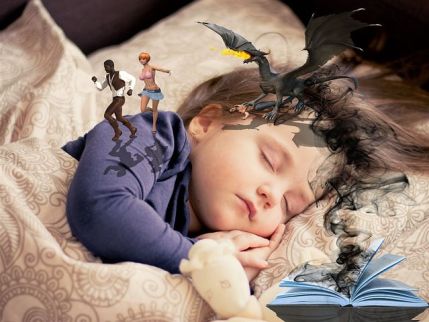
If you’ve ever experienced them, you know how frightening it can be to hear your own child scream out and thrash about in the dark of the night, yet not recognize you or have any remembrance of the experience at all. Night terrors are common enough, yet, thankfully, not every family experiences them.
Nightmares vs. night terrors
• One distinct difference between nightmares and terrors is the timing during the sleep cycle. Night terrors typically occur within the first 90 minutes of falling asleep, before the REM cycle begins.
• Night terrors surface between the ages 3 through 12, where nightmares can occur throughout anyone’s lifetime.
• A child can scream out or be paralyzed from fear, may have their eyes open as if to be completely awake, yet have no awareness or memory of the experience.
• Those experiencing a true terror will be difficult to arouse, while someone having a nightmare can be awakened.
Avoiding night terrors
Night terrors are thought to be caused by either medical or mental health issues. Medically, sleep apnea or certain medications may contribute, and common medications, including antihistamines have been known to trigger both night terrors and sleep walking. Mental health issues may include anxiety or stress. How can a child as young as 3 years old possibly experience stress? Exposure to television violence, video games, newscasts, household chaos, domestic disputes or even playground conflict can cause great emotional distress for a young child. Children can misinterpret media or feel helpless in their environment, yet not speak about it or ask for help.
One mom’s experience
During a recent conversation with a mom concerned with her child’s night terrors, she revealed that her own childhood night terrors often included sleep walking. Although sleep walking is different in that the child remains in bed, the triggers and the result (of the child remaining asleep) are similar. This mom’s sleep walking took her out of the house onto the stone driveway, where she screamed and pounded on the gravel, until her parents found her. She woke in the morning with cut feet and laryngitis from screaming, but no memory of the event. This lasted through her pre-teen years, when doctors finally attributed her night activity to antihistamine medications she was being given.
When your child has night terrors
Twenty years ago, when my children were young, one of my three children experienced frequent night terrors. They lasted for over a year, from the time he was 3 years old. The recommendation at that time was to gently move your screaming, thrashing child from his bed into a dimly lit bathroom and into a warm tub, so he could slowly wake in a calm environment. It was always unsettling for my son to find himself in a bathtub in the middle of the night, and he had a difficult time returning to sleep. Now the recommendation is to remain as calm as possible (no easy task) and provide a safe environment by removing hard objects from the bedside, while protecting your child from falls. They will sleep through it, although you’ll probably be rattled for hours.
• Inform your pediatrician to identify or rule out medical causes, such as sleep apnea or medications.
• Keep track on a calendar to note the frequency, duration and possible triggers.
• Look for triggers that include a chaotic bedtime, yelling, lack of routine or consistency, or any other frightening events that can disrupt the emotional stability of a child’s immature brain. Harvard studies indicate that even shouting can damage a sense of security and contribute to behavioral health issues.
• Be mindful in developing a consistent, peaceful nightly routine, with time for quiet talk to process the day’s events.
• Maintain a peaceful nightly routine as much as possible, even over weekends, vacation breaks and summertime.
• Minimize or eliminate caffeinated products and sugars from late afternoon into the evening, and replace with protein snacks (cheese, sliced turkey, hummus) to minimize dips in glucose levels, which can cause night waking.
• Eliminate screen time, rough housing, loud noises and bright lights for at least one hour before bed.
Take back your nights! Bedtime doesn’t have to be a horrible experience for everyone, as many parents profess. Utilize some of these gentle suggestions, whether your child has night terrors or not, and develop a calm, loving environment that supports your growing child’s physical and emotional development.
Diana Boggia, M.Ed. is a parent coach and author of “Parenting with a Purpose”. Send your family-related questions to FamilyMatters@Cantonrep.com. Find videos and parent resources on Facebook, Parent with a Purpose, and links to her Repository columns at www.ParentWithaPurpose.com.